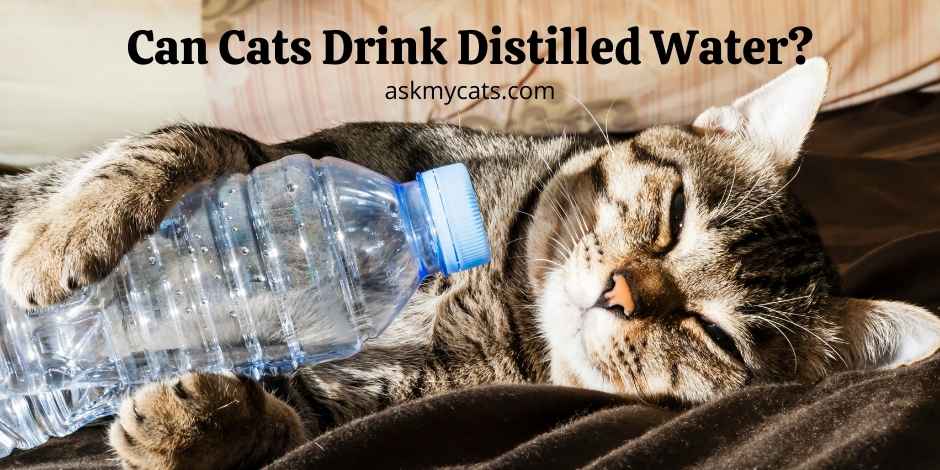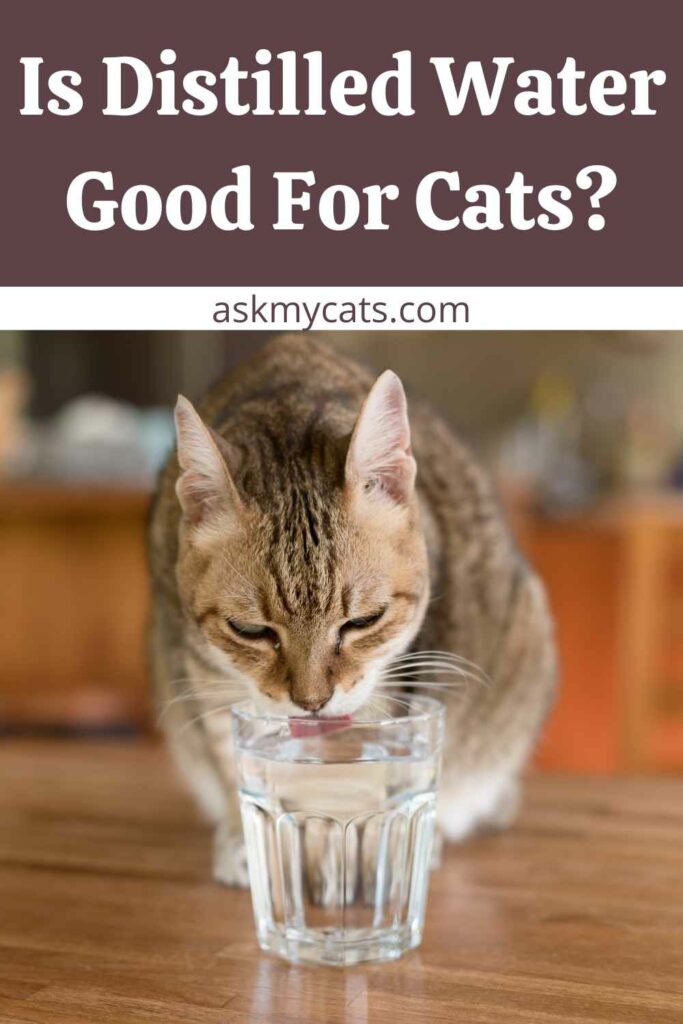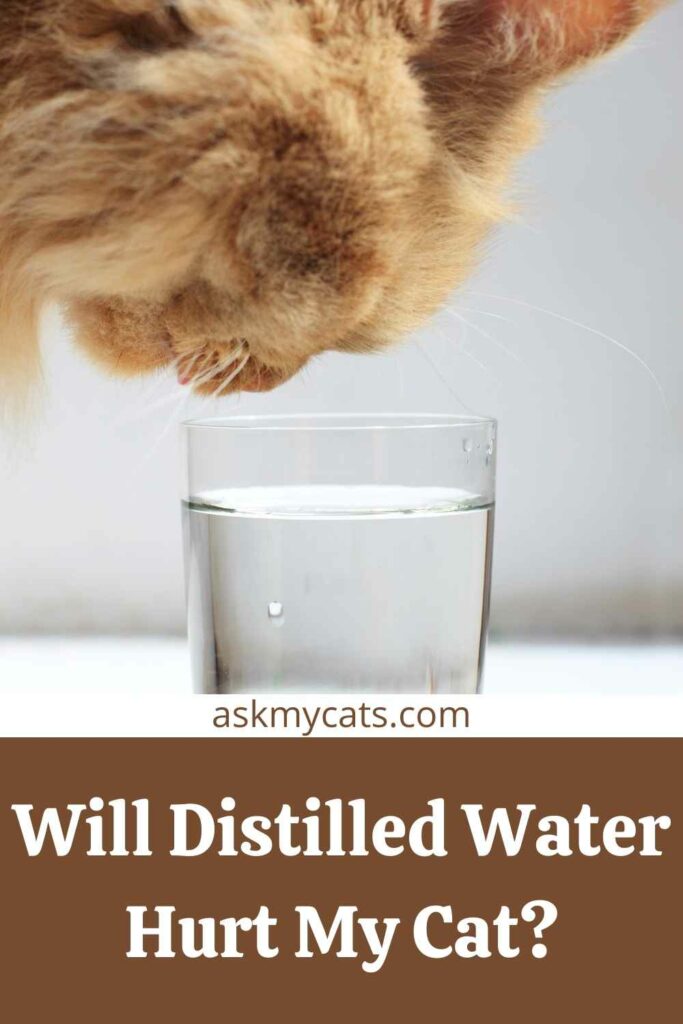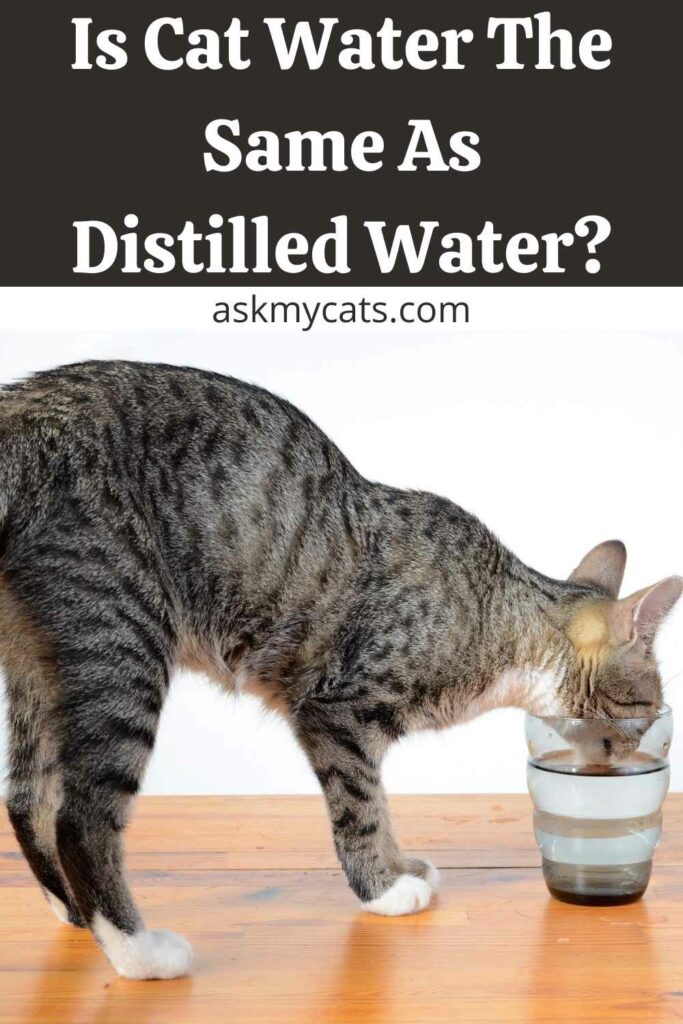Distilled water is preferred for human consumption since it has been purified of all contaminants through a boiling and condensation procedure. It’s frequently used as part of a detoxification process for this reason, but just because it’s harmless and possibly good for us doesn’t imply it’s the same for our dogs.
Distilled water has an unsuitable pH for feline intake and has been stripped of important electrolytes and minerals, making it unsuitable for cats.
Purified, spring, and tap water are typically favoured, and there are techniques to encourage a cat to drink more water instead of experimenting with different varieties.
Let’s find out different cases regarding cats and distilled water!


Give Your Cat the Perfect Day
Get the Free Ebook!
Is Distilled Water Good For Cats?
It is not suggested for cats to consume distilled water.

This water is made by catching the steam that is produced when ordinary water is boiled. As the steam cools, it condenses into distilled water under sterile conditions. Impurities, minerals, and electrolytes are all removed in this process.
People drink distilled water because it has relatively few pollutants since they have all been boiled off before the water is recondensed. However, because the distillation process also eliminates minerals, which are what give tap water its flavour, it is believed to have a flatter flavour.
Impurities have been removed from distilled water. After the water has boiled and condensed, the steam is allowed to cool and return to a liquid form.
While some argue that distilled water is helpful because it has no pollutants that might harm a person’s body, others argue that it eliminates minerals from the body.
People believe that the truth resides somewhere in the middle of these two schools of thinking.
Owners of cats are advised against feeding them distilled water since it has major, negative consequences for them.
Will Distilled Water Hurt My Cat?
Distilled water is not a good choice and may cause more damage than benefit to your cat.

If your cat doesn’t have any access to water and all you have is distilled, a modest amount of distilled water as a one-time treat could suffice. Additionally, if your cat drinks distilled water from your glass or bottle, it should be acceptable as long as they have access to regular water that is rich in electrolytes and essential minerals.
However, providing your cat with a more healthful supply of water is the best alternative. In general, if tap or spring water is deemed acceptable for humans; it should be safe for cats as well.
It should not be poisonous and preserves the needed trace minerals and electrolytes. Bottled spring water is also healthy for cats to drink, however it can be an expensive option to keep your cat hydrated.
Moving water is preferred by cats over static water. This explains why they are content to drink from a running faucet or even a newly flushed toilet, but rarely from a motionless bowl of water. Water-cycling feline fountains are available for purchase. The water is continually flowing, enticing cats to investigate the source of water and take a drink.
Wet food or canned food can also be added to your cat’s diet. This includes water, which keeps your cat hydrated as it eats. Even if you just provide wet food, you should always make sure your cat has access to fresh water that is replenished on a regular basis.
Cats might be fussy about where they get their water. They’ll drink from puddles and half-filled sinks with a leaking faucet, but not from the water dish you’ve supplied. Even if you think distilled water would help your cat hydrate better, don’t use it instead of tap or spring water.
When a cat needs alkaline water, distilled water is acidic, and it has been depleted of electrolytes and trace minerals that your cat need.
Cats, like humans, require adequate hydration. People understand this and drink water to be healthy, but convincing a cat that drinking water is good for it is a lot more difficult. Many cat owners will relate to how tough it is to convince a cat to drink any water at all.
Wet food and canned food contain a lot of moisture, which can help a cat stay hydrated. Cats who consume dry kibble or a mix of wet and dry food, on the other hand, may require more hydration to make up for the lack of water they receive. Cats, on the other hand, do not normally appreciate drinking from a water bowl.
They can get it from a flowing faucet or another source of moving water, but not from a still bowl of water.
As a consequence, the owners have tried a variety of things, including providing various sorts of water. They believe that a cat’s refusal to drink water is due to a dislike of the flavour, and that providing distilled water, for example, will encourage your feline companion to drink more. However, as previously said, this is not the best option.
During the distillation process, electrolytes are removed. These are trace minerals that the cat’s body need, such as sodium, potassium, and magnesium. When combined with water, they conduct an electrical charge, and while cats acquire a lot of their nutrients and minerals from their food, they also get a lot from the water they drink.
For cats, water is more than just a source of hydration, and eliminating the electrolytes during the distillation process means a cat will obtain less of the trace minerals they need, and they may become deficient in one of these vital components.
The chemical composition of water is also altered throughout the distillation process. It lowers the pH value to below 7, indicating that distilled water is acidic. Because a cat’s body is alkaline, providing them acidic water, such as distilled water, raises the risk of urinary infections and other problems.
Furthermore, because the water lacks minerals such as potassium, it will effectively leech these elements from the cat in order to attain parity. In cats who drink distilled water, this can cause sodium and potassium shortage.
Is Cat Water The Same As Distilled Water?
No, cat water and distilled water is not the same thing.

The water used in demineralized and distilled waters is often obtained from city treatment plants and contains all of the chemicals employed in these facilities, including chlorine. Reverse osmosis, a sort of filtering that might expose water to bacterial contamination, is the most common method for demineralization.
Furthermore, the filtration procedure does not fully demineralize the water; certain minerals remain. Cat Water is mineral-free since it is distilled natural spring water.
A cat’s urine should ideally have a pH of 6.2 to 6.4, which is why CatWater ensures a little acidic water with the perfect pH environment for cats, ranging from 6.2 to 6.4.
In comparison, the pH of the water we consume on a daily basis is typically between 7.2 and 7.8, which is too alkaline for a cat’s requirements. The typical pH of store distilled water is 5.4, which is excessively acidic for cats.
A pH level in a cat’s urine is too high or too low and can cause the creation of crystals and/or stones. It can cause urinary issues and pain or possibly constitute a medical emergency for the cat.
Should Cats Drink Distilled Water?
Cats should not drink distilled water.
The pH of distilled water is less than 7, making it acidic. The body of your cat is intended to function in an alkaline environment. Distilled water can cause your cat’s pH to drop into the acidic range, increasing the risk of a urinary tract infection or stones.
Due to the lack of minerals in distilled water, it might actually remove minerals from your cat’s system. This is due to a process known as osmosis, in which solutes in water such as potassium and sodium move from a high-concentration location to a lower-concentration area until they’re nearly equal.
To function properly, your cat’s body need potassium and salt. If your cat drinks distilled water, it will eliminate potassium and sodium as it passes through his intestines, perhaps leading to a shortfall if you give it to him for an extended length of time.
Distilled Water For Cats With Urinary Issues
Distilled water is not recommended for cats suffering from urinary issues.
Distilled water has the ability to leach molecules from the body, which are then excreted in the urine.
However, some of these chemicals are good, such as salt and potassium, which your cat’s body requires to function properly.
We would never propose detoxing your cat’s system with distilled water. Consult your veterinarian instead, who will be able to walk you through their advice.
Is Distilled Water Good For Cats With Crystals?
No, distilled water is not good for cats with crystals.
Frequently Asked Questions
What kind of water should a cat drink?
Filtered water or water that has gone through a Reverse Osmosis system is very beneficial to us. We drink from a glass that has been filled. The water in our cats’ bowls, on the other hand, stays in the dish for days, and chlorine helps keep the water safe.
Is it OK for cats to drink distilled water?
We recommend filtered tap water or spring water for drinking. In general, if the water is safe for you to drink, it is safe for your pet to drink as well. Use distilled water instead of tap water since distilled water is acidic and can drop your cat’s urine pH below 6, which can lead to stones or crystals.
Can hard water cause urinary crystals in cats?
In comparison to male cats living in locations with “somewhat hard,” “hard,” or “very hard” water, male cats living in places with “very hard” water had a substantially greater frequency of urinary health issues—especially crystalluria—and were three times as likely to develop urinary problems.
Final Words
If your cat solely drinks distilled water, it can remove important minerals from its body, perhaps causing imbalances and even sickness.
It can also make their urine more acidic, putting them at risk for urinary tract problems.
It’s acceptable to use in an emergency if you don’t have any other options, but make sure to switch back to your usual water as quickly as possible.
If you have any unanswered questions, ask us in the comments section.
